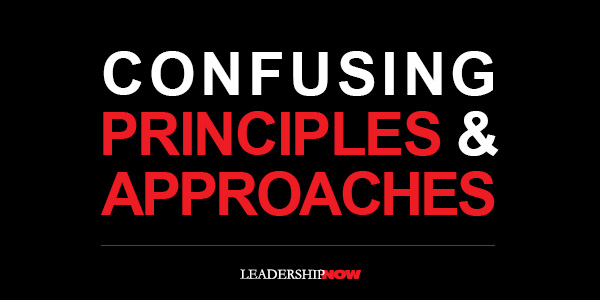 |
 |
05.15.09

Confusing Principles and Approaches
IN How the Mighty Fall, Jim Collins makes a case for why the fall of previously great companies does not negate prior research: The principles in Good to Great were derived primarily from studying specific periods in history when the good-to-great companies showed a substantial transformation into an era of superior performance that lasted fifteen years. The research did not attempt to predict which companies would remain great after their fifteen-year run. Indeed, as this work shows, even the mightiest of companies can self-destruct.Of course, the same is true of the classic by Tom Peters and Bob Waterman, In Search of Excellence. The failure or declining performance of some people and organizations does not negate the basic message. It is part of being human to get ourselves off-course—even when we know better. The failure of the exemplary companies to maintain their hold on greatness or excellence does, however, hold an important lesson for us. It’s all too easy to move away from our core values. They are always under fire and it takes courage to hold the course. Everything we do has to be continually reviewed and realigned to our core values. As you know, knowing the right thing to do and doing it are two different issues. More to the point, doing the right thing once and doing it consistently over time in the face of circumstances that would derail us, is a matter of character. We depart from our core values over time for all kinds of reasons. Doing the right thing doesn’t always give us an immediate payoff in the way we typically gauge success. Doing the right thing is often its own reward. In time, life happens to us and changes our thinking and encourages compromise. Comparing ourselves to others creates doubt. Cynicism is always at the door demanding a hearing and makes sense in a world that rarely works according to plan; a world that is seemingly more irrational than rational. Life changes our friends and they influence us too. All of these circumstances conspire to make us grow or self-destruct. It’s a choice we make every day. This leads us to a cautionary note. In the search for timeless and universal principles that can be applied in any organization, you will frequently find confusion between principles and approaches. Principles are timeless and universal, but approaches are not. Humility is a timeless and universal principle. The Hedgehog Concept is an approach and therefore is not timeless or universal. The approach has been around since recorded time, but is contextual. It will work in some situations and not in others. Approaches change. Principles do not. Principles speak to matters of thinking and behavior that go beyond the moment and to a higher purpose. Approaches are tools. Principles give us meaning. It’s best not to confuse the two.  
Posted by Michael McKinney at 09:02 AM
|
BUILD YOUR KNOWLEDGE
 

How to Do Your Start-Up Right STRAIGHT TALK FOR START-UPS 
Grow Your Leadership Skills NEW AND UPCOMING LEADERSHIP BOOKS 
Leadership Minute BITE-SIZE CONCEPTS YOU CAN CHEW ON 
Classic Leadership Books BOOKS TO READ BEFORE YOU LEAD |